Related Research Articles

Hunter Stockton Thompson was an American journalist and author who founded the gonzo journalism movement. He rose to prominence with the publication of Hell's Angels (1967), a book for which he spent a year living and riding with the Hells Angels motorcycle gang to write a first-hand account of their lives and experiences.

Rolling Stone is an American monthly magazine that focuses on music, politics, and popular culture. It was founded in San Francisco, California, in 1967 by Jann Wenner, and the music critic Ralph J. Gleason. It was first known for its coverage of rock music and political reporting by Hunter S. Thompson. In the 1990s, the magazine broadened and shifted its focus to a younger readership interested in youth-oriented television shows, film actors, and popular music. It has since returned to its traditional mix of content, including music, entertainment, and politics.
Jann Simon Wenner is an American magazine magnate who is the co-founder and publisher of the popular culture magazine Rolling Stone, and former owner of Men's Journal magazine. He participated in the Free Speech Movement while attending the University of California, Berkeley. Wenner, with his mentor Ralph J. Gleason, co-founded Rolling Stone in 1967.
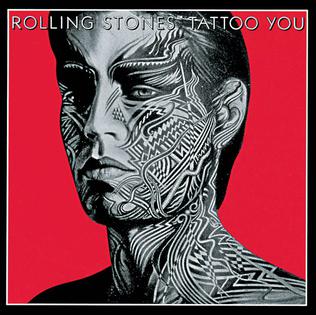
Tattoo You is the 16th British and 18th American studio album by the English rock band the Rolling Stones, released on 24 August 1981 by Rolling Stones Records. The album is mostly composed of studio outtakes recorded during the 1970s, and contains one of the band's most well-known songs, "Start Me Up", which hit number two on the US Billboard singles charts.

Let It Bleed is the 8th British and 10th American studio album by the English rock band the Rolling Stones, released on 28 November 1969 London Records in the United States and shortly thereafter by Decca Records in the United Kingdom. Released shortly after the band's 1969 American Tour, it is the follow-up to 1968's Beggars Banquet. As with Beggars Banquet, the album marks a return to the group's more blues-sound approach that was prominent in the pre-Aftermath period of their career. Additional sounds on the album draw influence from gospel, country blues and country rock.

Us Weekly is a weekly celebrity and entertainment magazine based in New York City. Us Weekly was founded in 1977 by The New York Times Company, who sold it in 1980. It was acquired by Wenner Media in 1986, and sold to American Media Inc. in 2017. Shortly afterward, former editor James Heidenry stepped down, and was replaced by Jennifer Peros. The chief content officer of American Media, Dylan Howard, oversees the publication.
David Weir is a journalist, author, and co-founder and former Executive Director of the Center for Investigative Reporting.
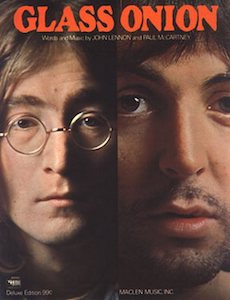
"Glass Onion" is a song by the English rock band the Beatles from their 1968 double album The Beatles. The song was written by John Lennon and credited to Lennon–McCartney.

"Ruby Tuesday" is a song recorded by the Rolling Stones in 1966, released in January 1967. The song became the band's fourth number-one hit in the United States and reached number three in the United Kingdom as a double A-side with "Let's Spend the Night Together". The song was included in the American version of Between the Buttons.

Men's Journal is an American monthly men's lifestyle magazine focused on outdoor recreation and comprising editorials on the outdoors, environmental issues, health and fitness, style and fashion, and gear. It was founded in 1992 by Jann Wenner of Wenner Media, who sought to create a publication for "active, accomplished men to fuel an adventurous and discerning lifestyle". Wenner Media sold Men's Journal to American Media, Inc. in 2017.

All Time Greatest Hits is a 2002 greatest hits album by country music artist Loretta Lynn.

Fear and Loathing in Las Vegas: A Savage Journey to the Heart of the American Dream is a 1971 novel by Hunter S. Thompson and illustrated by Ralph Steadman. The book is a roman à clef, rooted in autobiographical incidents. The story follows its protagonist, Raoul Duke, and his attorney, Dr. Gonzo, as they descend on Las Vegas to chase the American Dream through a drug-induced haze, all the while ruminating on the failure of the 1960s countercultural movement. The work is Thompson's most famous book, and is noted for its lurid descriptions of illegal drug use and its early retrospective on the culture of the 1960s. Thompson's highly subjective blend of fact and fiction, which it popularized, has become known as gonzo journalism. The novel first appeared as a two-part series in Rolling Stone magazine in 1971, and was published as a book in 1972. It was later adapted into a film of the same title in 1998 by Terry Gilliam, starring Johnny Depp and Benicio del Toro who portrayed Raoul Duke and Dr. Gonzo, respectively.
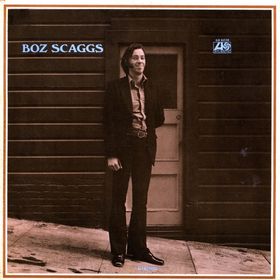
Boz Scaggs is the second studio album by American musician Boz Scaggs, released in 1969 by Atlantic Records. A stylistically diverse album, Boz Scaggs incorporates several genres, including Americana, blue-eyed soul, country, and rhythm and blues. The lyrics are about typical themes found in blues songs, such as love, regret, guilt, and loss. Scaggs recorded the album at Muscle Shoals Sound Studio with producer Jann Wenner, the co-founder of Rolling Stone magazine. The Muscle Shoals Rhythm Section heavily contributed to the album, which included a young Duane Allman, before his rise to fame with the Allman Brothers Band.
"I Shall Be Released" is a 1967 song written by Bob Dylan.
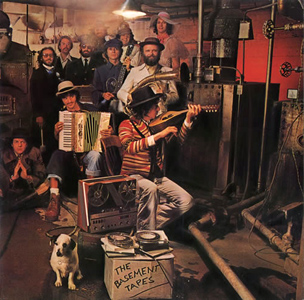
The Basement Tapes is the 16th album by American singer-songwriter Bob Dylan and his second with the Band. It was released on June 26, 1975, by Columbia Records. Two-thirds of the album's 24 tracks feature Dylan on lead vocals backed by the Band, and were recorded in 1967, eight years before the album's release, in the lapse between the recording and subsequent release of Blonde on Blonde and John Wesley Harding, during sessions that began at Dylan's house in Woodstock, New York, then moved to the basement of Big Pink. While most of these had appeared on bootleg albums, The Basement Tapes marked their first official release. The remaining eight songs, all previously unavailable, feature the Band without Dylan and were recorded between 1967 and 1975.
Rolling Stone Australia is the Australian edition of the United States' Rolling Stone magazine devoted to music, politics, and popular culture, published monthly. The Australian version of Rolling Stone was initially published in 1970 as a supplement in Revolution magazine published by Monash University student Phillip Frazer. It was launched as a fully fledged magazine in 1972 by Frazer and was the longest surviving international edition of Rolling Stone until its last issue appeared in January 2018.

Anna-Lou Leibovitz is an American portrait photographer best known for her engaging portraits, particularly of celebrities, which often feature subjects in intimate settings and poses. Leibovitz's Polaroid photo of John Lennon and Yoko Ono, taken five hours before Lennon's murder, is considered one of Rolling Stone magazine's most famous cover photographs. The Library of Congress declared her a Living Legend, and she is the first woman to have a feature exhibition at Washington's National Portrait Gallery.
Rolling Stone was a weekly tabloid newspaper published in Kampala, Uganda. The paper published its first issue on 23 August 2010, under the direction of 22-year-old Giles Muhame and two classmates from Kampala's Makerere University. According to Muhame, the paper's title was derived from the local word enkurungu: "It's a metaphor for something that strikes with lightning speed, that can kill someone if it is thrown at them." The paper was small, with a circulation of approximately 2000 copies. It suspended publication in November 2010 after the High Court ruled that it had violated the fundamental rights of LGBT Ugandans by attempting to out them and calling for their deaths. One of those listed, David Kato, was subsequently murdered.
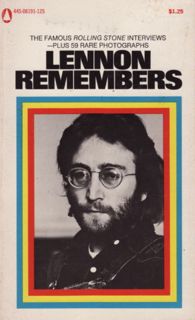
Lennon Remembers is a 1971 book by Rolling Stone magazine co-founder and editor Jann Wenner. It consists of a lengthy interview that Wenner carried out with former Beatle John Lennon in December 1970 and which was originally serialised in Rolling Stone in its issues dated 21 January and 4 February 1971. The interview was intended to promote Lennon's primal therapy-inspired album John Lennon/Plastic Ono Band and reflects the singer's emotions and mindset after undergoing an intense course of the therapy under Arthur Janov. It also serves as a rebuttal to Paul McCartney's public announcement of the Beatles' break-up, in April 1970.
References
- 1 2 Wenner, Jann (2006)."Our 1000th Issue – Jann Wenner looks back on 39 years of Rolling Stone" RollingStone.com . Retrieved September 21, 2006.
- ↑ "Madonna on the Cover Through the Years". Rolling Stone. November 6, 2018. Archived from the original on December 24, 2021. Retrieved February 11, 2022.
- ↑ "First Time on the Cover of Rolling Stone". Rolling Stone. November 1, 2011.